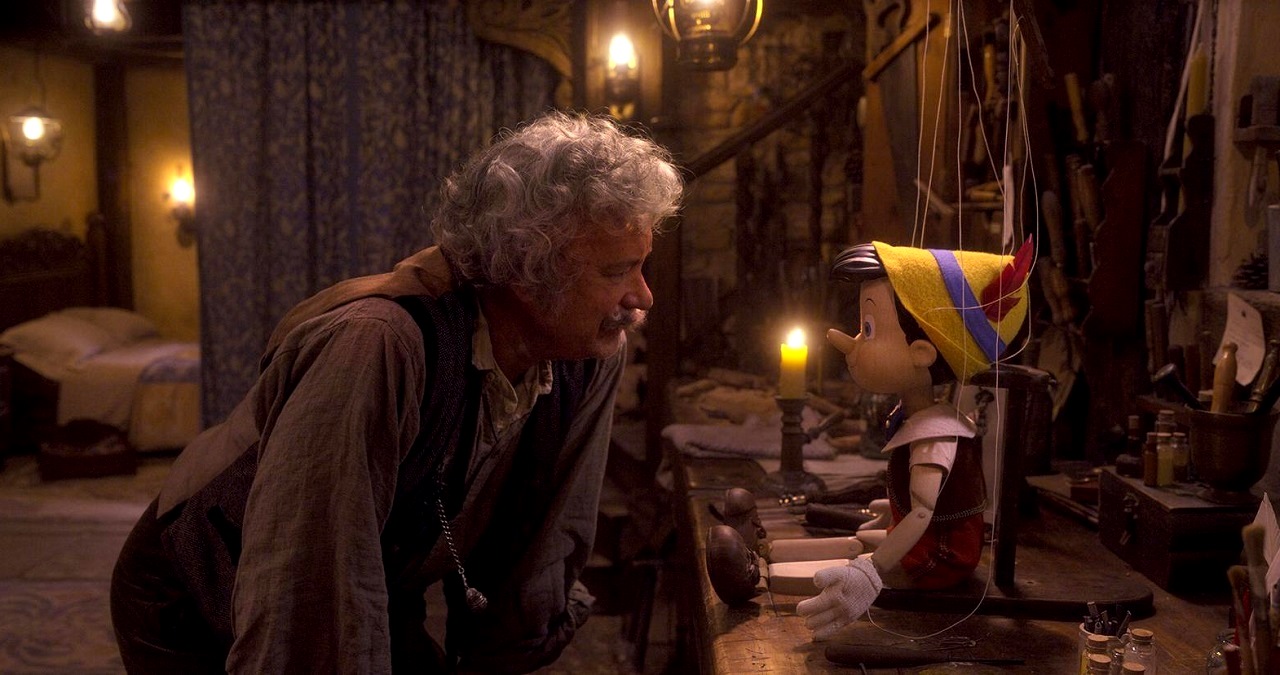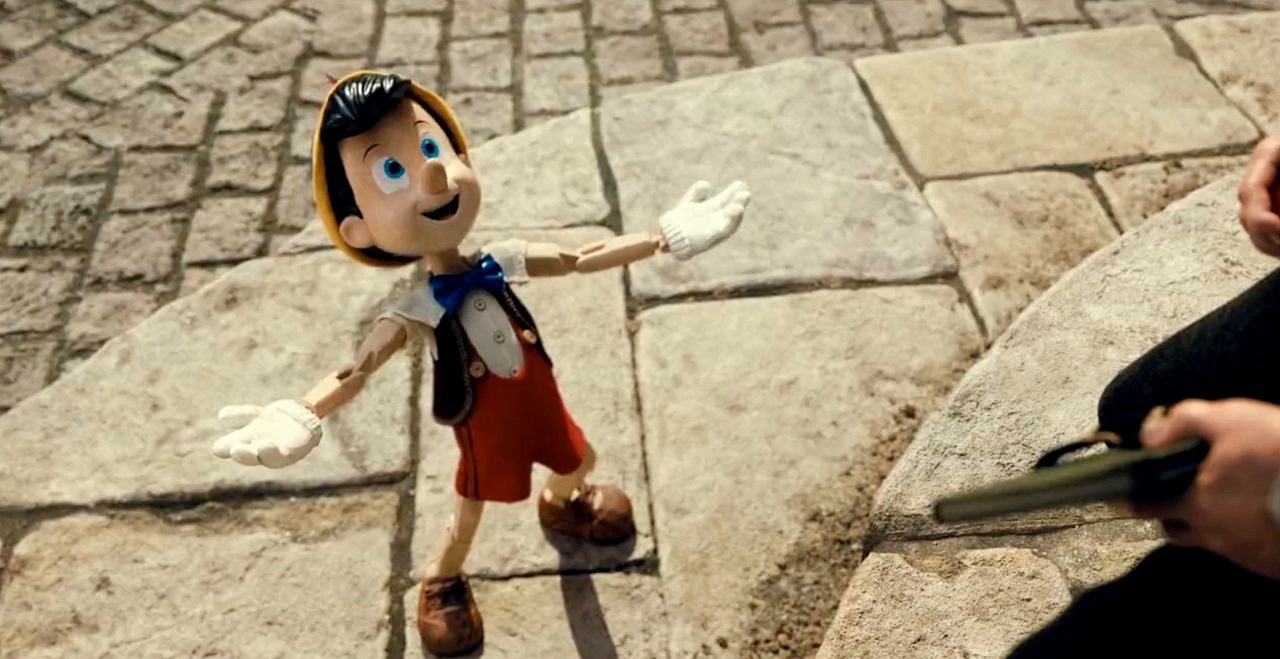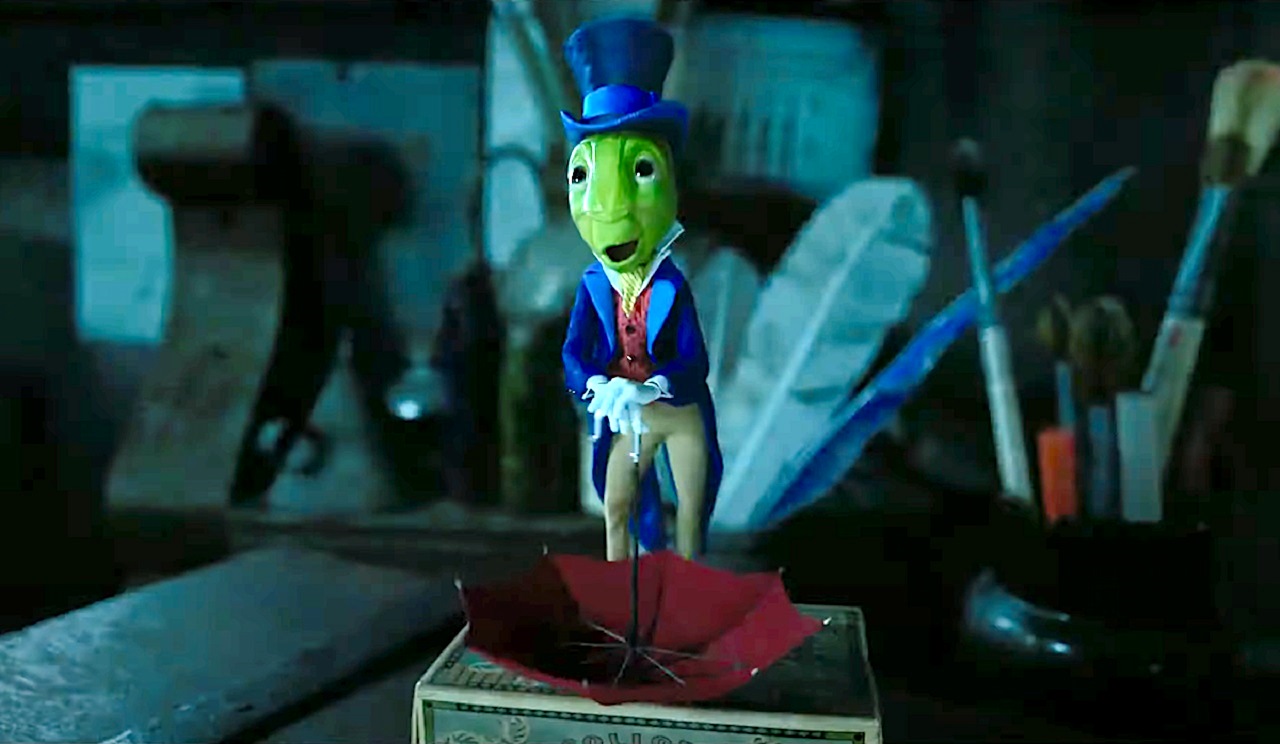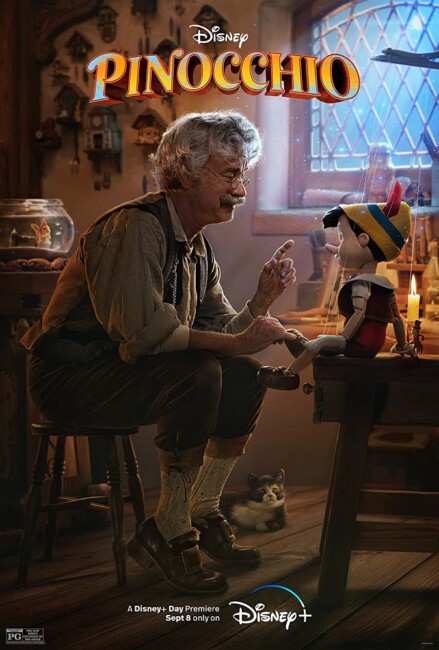USA. 2022.
Crew
Director – Robert Zemeckis, Screenplay – Chris Weitz & Robert Zemeckis, Based on the Novel The Adventures of Pinocchio (1883) by Carlo Collodi, Producers – Derek Hogue, Andrew Miano, Chris Weitz & Robert Zemeckis, Photography – Don Burgess, Music – Alan Silvestri, Songs – Glen Ballard & Alan Silvestri, Visual Effects Supervisor – Kevin Baillie, Visual Effects – MPC (Supervisor – Ben Jones, Animation Supervisors – Christopher Paradis & Kaveh Ruitan), Special Effects Supervisor – Alistair Williams, Production Design – Doug Chiang & Stefan Dechant. Production Company – Disney/Depth of Field/ImageMovers.
Cast
Benjamin Evans Ainsworth (Voice of Pinocchio), Tom Hanks (Gepetto), Joseph Gordon Levitt (Voice of Jiminy Cricket), Keegan-Michael Key (Voice of Honest John), Giuseppe Battiston (Stromboli), Kyanne Lamaya (Faviana), Cynthia Erivo (Blue Fairy), Lorraine Bracco (Voice of Sofia), Luke Evans (Coachman), Lewin Lloyd (Lampwick), Angus Wright (Signor Rizzi), James Demetriou (Headmaster)
Plot
The toymaker Gepetto misses his late son and creates a puppet in his likeness. He names the puppet Pinocchio because it is made of pine wood. All of this is observed by Jiminy Cricket who has snuck into the workshop. That night, as he goes to sleep, Gepetto makes a wish on the wishing star and this causes Pinocchio to come to life. The Blue Fairy then appears and sorts Pinocchio out, while appointing Jiminy as Pinocchio’s conscience. Gepetto decides that Pinocchio must go to school. However, Pinocchio is waylaid by two conmen who persuade him that fame is better and sell him to Stromboli’s circus where he is forced to perform. Jiminy helps Pinocchio make an escape but Pinocchio is then snatched up and taken to Pleasure Island where all children are free to do as they wish but meet a nasty fate.
Pinocchio was a character created by Florentine writer Carlo Lorenzini (1826-90) who wrote under the pen name Carlo Collodi. Pinocchio originally appeared in a series of stories serialised in Il Giornale dei Bambini (The Children’s Journal) between 1881 and 1882, which were then collected together in book form as The Adventures of Pinocchio (1883). There have been numerous film versions made of the story ever since the silent era (see below for a full list of these). The definitive version of the story has been the Disney animated version Pinocchio (1940), even though this added many elements that were not in Carlo Collodi’s text.
This is the first of two versions of the story to arrive in 2022 and will be followed by Guillermo Del Toro’s animated Pinocchio (2022) three months later. Unlike Del Toro, this version is a direct remake of the Disney film. Such a version had been planned for a number of years and was at one point to have been directed by Sam Mendes. There is the clear sense that Disney accelerated this version into production to beat the Del Toro film into release.
Pinocchio now joins a whole host of Disney animated films that have been remade or revived in live-action in the last few years, following the highly successful Tim Burton Alice in Wonderland (2010). Others include Maleficent (2014), Cinderella (2015), Pete’s Dragon (2016), The Jungle Book (2016), Beauty and the Beast (2017), Aladdin (2019), Dumbo (2019), Lady and the Tramp (2019), The Lion King (2019), Mulan (2020), Cruella (2021), The Little Mermaid (2023), Peter Pan and Wendy (2023), Lilo & Stitch (2025) and Snow White (2025).

This is not the first time that Pinocchio has been so revived. The first occasion where a previous Disney film was conducted in live-action was with Steven Spielberg’s Hook (1991). This begat the first wave of live-action remakes that included revivals of The Jungle Book (1994) and 101 Dalmatians (1996), plus various remakes of their live-action films with the likes of That Darn Cat (1997), Flubber (1997), The Parent Trap (1998), Freaky Friday (2003), Herbie: Fully Loaded (2005), The Shaggy Dog (2006), Race to Witch Mountain (2009) and Tron Legacy (2010). Amid this, there was also a version of Pinocchio conducted with The Adventures of Pinocchio (1996), which created a CGI Pinocchio, although that was not produced by Disney.
This version comes from Robert Zemeckis, the director celebrated for works like Back to the Future (1985), Who Framed Roger Rabbit? (1988), Forrest Gump (1994) and Contact (1997), among other works. (See below for Robert Zemeckis’s other genre films). Since the early 2000s, Zemeckis has come to specialise in films using motion-capture animation with the likes of The Polar Express (2004), Beowulf (2007) and A Christmas Carol (2009) or integrated with live-action as in Welcome to Marwen (2018), while he has also produced several other works using the motion capture process such as Monster House (2006), Mars Needs Moms (2011), Real Steel (2011) and Finch (2021).
The surprising name on the script is that of Chris Weitz who, along with his older brother Paul, made the enormously successful American Pie (1999). As a directing team, the Weitz brothers’ made Down to Earth (2001) and About a Boy (2002), as well as co-wrote Antz (1998) and The Nutty Professor II: The Klumps (2000). Chris made his solo directorial debut with the fantasy film The Golden Compass (2007) and then went onto the Twilight sequel New Moon (2009), the AI horror Afraid (2024) and several other non-genre films. Chris had previously co-written the Disney live-action Cinderella.

It is important to note that this is a direct remake of the 1940 Disney animated version rather than one that returns to the Carlo Collodi story. The plot follows the Disney version in mostly identical ways including retaining characters and aspects – Jiminy Cricket, the Blue Fairy and Wishing Star, Figaro the cat and Cleo the goldfish – which were original to the Disney film but not Collodi. The film replicates the animated design of Gepetto’s workshop, right down to the fat-bottomed doll and the goldfish on a stand in the middle of the room, as well as the look of Pleasure Island. The film also conducts a CGI version of the original designs of the animated Pinocchio. There is even the reuse of several of the songs from the original, alongside a number of other original songs. There are some minor changes added over the original – the introduction of Kyanne Lamaya as the crippled puppeteer Fabiana, while Pinocchio becoming a living boy at the end is left ambiguous unless you look closely.
Most of the other Disney live-action remakes – Aladdin, Dumbo, The Lion King, Mulan, Lady and the Tramp – have left me feeling monumentally indifferent. They resurrect films that had charm and life the first time around but are in themselves lifeless three-dimensional recreations that go through the moves, mimic the look and plot but lack the essential soul or innocence of the originals.
The CGI work that gives us Pinocchio as a living character is very accomplished, as is the CGI/live-action mix that brings other characters such as Honest John and Gideon to life. Pinocchio is an anthropomorphically innocent character and you attune to his stumblings through situations. Zemeckis does perhaps hurry through some of these – the Monstro encounter – even if the remake comes in at seventeen minutes longer than the original.

What perhaps stops Pinocchio from becoming more than it could have been is a screenplay the keeps puncturing the fourth wall. This begins from a grating opening where Joseph Gordon-Levitt’s voiceover narration as Jiminy Cricket gets into an argument with his younger self in which they deconstruct the meaning of ‘once upon a time.’ In the scenes in Gepetto’s workshop, we get constant reference to other Disney films with likenesses of Donald Duck, Maleficent, Dumbo and even Roger and Jessica Rabbit kissing from Zemeckis’ Who Framed Roger Rabbit? popping out from the cuckoo clocks.
Furthermore, we get a number of lines that puncture the suspension of disbelief. Pinocchio is now said to be made of pine wood, all for the purpose of setting up a gag later on where Honest John suggests he adopt a stage name: “I’ve got it – Chris Pine.” There are also some grating modernisms that creep in – “when someone calls themselves honest they aren’t – especially if they call themselves an agent.” Or people talking about being an ‘influencer’ or different systems of learning in school – and only serve to abruptly draw you out of the fantasy.
Robert Zemeckis’s other films are:– I Wanna Hold Your Hand (1978), Used Cars (1980), Romancing the Stone (1984); his time travel trilogy Back to the Future (1985), Who Framed Roger Rabbit? (1988), Back to the Future Part II (1989) and Back to the Future Part III (1990), the immortality black comedy Death Becomes Her (1992), the alien contact film Contact (1997), the ghost story What Lies Beneath (2000), the computer-animated Christmas fantasy The Polar Express (2004), the computer-animated adaptations of Beowulf (2007) and A Christmas Carol (2009), Flight (2012), The Walk (2015), Allied (2016), the true-life based Welcome to Marwen (2018) where Steve Carell builds a fantasy village of dolls, the remake of The Witches (2020) and Here (2024) about the same room throughout history. Zemeckis has also produced a large number of other genre films including the Tales from the Crypt (1989-96) cable tv horror anthology series, the two film spinoffs Tales from the Crypt Presents Demon Knight (1995) and Tales from the Crypt Presents Bordello of Blood (1996), Peter Jackson’s The Frighteners (1996), the voodoo film Ritual (2002), the the CGI-animated Monster House (2006) and Mars Needs Moms (2011), Real Steel (2011), the tv series’ Manifest (2018-22) about a planeload of temporally displaced passengers and Project Blue Book (2019-20) about the US Air Force’s true life UFO investigation department and the robot film Finch (2021). Zemeckis was also a producing partner in Dark Castle Entertainment, which have made a number of horror films including House on Haunted Hill (1999), Thir13een Ghosts (2001), Ghost Ship (2002), Gothika (2003), House of Wax (2005) and The Reaping (2007).
Other versions of Pinocchio are:– a lost Italian adaptation in 1911; The Golden Key (1939), an uncredited live-action version made in the USSR; the Disney animated version Pinocchio (1940); an Italian live-action version The Adventures of Pinocchio (1947); Pinocchio (1957), a 60 minute NBC tv special starring Mickey Rooney as Pinocchio; Pinocchio (1965), a lost CBS tv special; the animated Italian sequel Pinocchio in Outer Space (1965) where Pinocchio ventures into space; Pinocchio (1967), a live-action East German production; The Erotic Adventures of Pinocchio (1971), which was advertized with the immortal line “It’s not his nose that grows”; an Italian tv mini-series The Adventures of Pinocchio (1972); a further Italian animated version The Adventures of Pinocchio (1972); Pinocchio (1976), a US tv version with Sandy Duncan as Pinocchio; Pinocchio (1978), a four part animated BBC tv adaptation; The Adventures of Pinocchio (1976), a Japanese animated tv series; Pinocchio’s Christmas (1980), an hour-long stop-motion animated tv special sequel from Rankin-Bass; a US animated version The Adventures of Pinocchio (1984); an Italian animated tv series The Adventures of Pinocchio (1985); an animated American sequel Pinocchio and the Emperor of the Night (1987); an Italian version Occhio Pinocchio (1994); a live-action American remake with a CGI Pinocchio, The Adventures of Pinocchio (1996), which also spawned a sequel, The New Adventures of Pinocchio (1999); a horror movie version Pinocchio’s Revenge (1996) that features a killer puppet; Gepetto (2000), a musical tv movie remake starring Drew Carey as Gepetto; Pinocchio (2002), directed by and starring Italian comedian Roberto Benigni; Pinocchio 3000 (2004), an animated adaptation that translates the story into sf terms with Pinocchio becoming an android; an Italian tv adaptation Pinocchio (2008); Matteo Garrone’s beautiful live-action Pinocchio (2019); and the stop-motion animated Guillermo Del Toro’s Pinocchio (2022). In the 1990s, a further remake of Pinocchio also became the subject of a lawsuit from director Francis Ford Coppola, who attempted to mount his own version of the tale set during Nazi-occupied France, which hit the headlines when Coppola sued Warner Brothers for $80 million, claiming that they had sabotaged the project. Pinocchio also turns up as a character in the fairytale spoofs Shrek 2 (2004) and Shrek the Third (2007).
Trailer here


